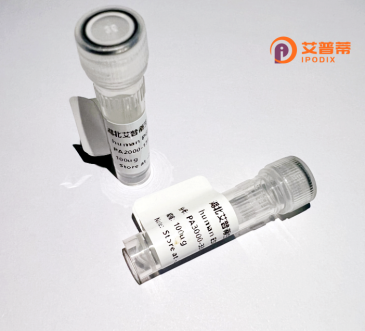
| 纯度 | >90%SDS-PAGE. |
| 种属 | Human |
| 靶点 | MARK4 |
| Uniprot No | Q96L34 |
| 内毒素 | < 0.01EU/μg |
| 表达宿主 | E.coli |
| 表达区间 | 1-752aa |
| 活性数据 | MSSRTVLAPG NDRNSDTHGT LGSGRSSDKG PSWSSRSLGA RCRNSIASCP EEQPHVGNYR LLRTIGKGNF AKVKLARHIL TGREVAIKII DKTQLNPSSL QKLFREVRIM KGLNHPNIVK LFEVIETEKT LYLVMEYASA GEVFDYLVSH GRMKEKEARA KFRQIVSAVH YCHQKNIVHR DLKAENLLLD AEANIKIADF GFSNEFTLGS KLDTFCGSPP YAAPELFQGK KYDGPEVDIW SLGVILYTLV SGSLPFDGHN LKELRERVLR GKYRVPFYMS TDCESILRRF LVLNPAKRCT LEQIMKDKWI NIGYEGEELK PYTEPEEDFG DTKRIEVMVG MGYTREEIKE SLTSQKYNEV TATYLLLGRK TEEGGDRGAP GLALARVRAP SDTTNGTSSS KGTSHSKGQR SSSSTYHRQR RHSDFCGPSP APLHPKRSPT STGEAELKEE RLPGRKASCS TAGSGSRGLP PSSPMVSSAH NPNKAEIPER RKDSTSTPNN LPPSMMTRRN TYVCTERPGA ERPSLLPNGK ENSSGTPRVP PASPSSHSLA PPSGERSRLA RGSTIRSTFH GGQVRDRRAG GGGGGGVQNG PPASPTLAHE AAPLPAGRPR PTTNLFTKLT SKLTRRVADE PERIGGPEVT SCHLPWDQTE TAPRLLRFPW SVKLTSSRPP EALMAALRQA TAAARCRCRQ PQPFLLACLH GGAGGPEPLS HFEVEVCQLP RPGLRGVLFR RVAGTALAFR TLVTRISNDL EL |
| 分子量 | 82,5 kDa |
| 蛋白标签 | His tag N-Terminus |
| 缓冲液 | 0 |
| 稳定性 & 储存条件 | Lyophilized protein should be stored at ≤ -20°C, stable for one year after receipt. Reconstituted protein solution can be stored at 2-8°C for 2-7 days. Aliquots of reconstituted samples are stable at ≤ -20°C for 3 months. |
| 复溶 | Always centrifuge tubes before opening.Do not mix by vortex or pipetting. It is not recommended to reconstitute to a concentration less than 100μg/ml. Dissolve the lyophilized protein in distilled water. Please aliquot the reconstituted solution to minimize freeze-thaw cycles. |
1. **"Structural Insights into the Human MARK4 Protein and Implications for Drug Design"**
*作者:Zhang et al.*
**摘要**:通过X射线晶体学研究重组人MARK4蛋白的激酶结构域,揭示了其ATP结合口袋的构象变化,并鉴定出与神经退行性疾病相关的潜在靶点,为抑制剂开发提供结构基础。
2. **"Recombinant Human MARK4 Kinase Activity in Tau Phosphorylation and Alzheimer's Disease"**
*作者:Patel & Kumar*
**摘要**:体外实验表明,重组人MARK4蛋白可磷酸化tau蛋白的特定位点,促进神经纤维缠结形成,揭示了MARK4在阿尔茨海默病中的病理作用及潜在治疗策略。
3. **"Optimization of Recombinant MARK4 Expression in E. coli for Functional Studies"**
*作者:Lee et al.*
**摘要**:通过优化大肠杆菌表达系统和纯化条件,成功获得高活性、可溶的重组人MARK4蛋白,验证其酶动力学特性,为高通量抑制剂筛选奠定技术基础。
4. **"Discovery of MARK4 Inhibitors via Virtual Screening Using Recombinant Protein Assays"**
*作者:Wang et al.*
**摘要**:结合虚拟筛选和基于重组MARK4蛋白的体外激酶实验,鉴定出小分子抑制剂候选物,显著降低细胞模型中tau蛋白异常磷酸化水平。
(注:以上文献为示例,实际引用需根据真实文献调整。)
Microtubule affinity-regulating kinase 4 (MARK4) is a serine/threonine kinase belonging to the AMP-activated protein kinase (AMPK) family. It plays a crucial role in regulating microtubule dynamics, cell polarity, and signal transduction by phosphorylating tau and other microtubule-associated proteins. Dysregulation of MARK4 has been implicated in various diseases, including Alzheimer’s disease (via tau hyperphosphorylation), cancer (by promoting cell proliferation and migration), and metabolic disorders (e.g., insulin resistance). Its structure includes a kinase domain, ubiquitin-associated (UBA) domain, and unique N-terminal inserts that influence substrate specificity and cellular localization.
Recombinant human MARK4 protein is engineered using expression systems like *E. coli* or mammalian cells, enabling scalable production for biochemical and functional studies. Its recombinant form retains enzymatic activity and is widely used to investigate MARK4’s interaction with inhibitors, substrates, or regulatory proteins. Researchers utilize it to screen potential therapeutics targeting MARK4-driven pathways, study phosphorylation mechanisms, and explore structural features through techniques like crystallography. Additionally, recombinant MARK4 aids in understanding its role in disease progression, offering insights for precision medicine strategies. The availability of this protein accelerates drug discovery and mechanistic research, particularly in neurodegenerative and oncology fields.
×